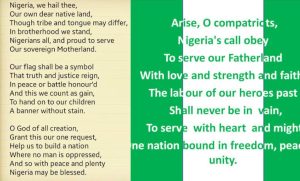Nigerians Must Seek Permission to Use National Anthem
The Nigerian government has recently announced that citizens must seek formal permission before using the national anthem. This directive aims to prevent potential misuse or misinterpretation of this important national symbol. The announcement was made by Lanre Issa-Onilu, the Director General of the National Orientation Agency (NOA), in a statement released on October 8, 2024.
Understanding the New Directive
According to Issa-Onilu, it is now compulsory for Nigerians to obtain approval from the NOA before using the anthem or its lyrics. This decision is part of a broader initiative to safeguard national symbols and ensure they are not misrepresented. “As custodians of Nigeria’s national symbols, the NOA is tasked with preventing all forms of misuse,” he stated.
Why This Matters
The national anthem holds significant cultural and historical value for Nigeria. It represents unity and patriotism among citizens. By requiring permission for its use, the government aims to maintain the anthem’s integrity and prevent any misinterpretation that could arise from unauthorized usage.
Clarification on Usage Context
While the directive emphasizes seeking permission, Issa-Onilu did not specify in what contexts this permission should be sought. This lack of clarity has raised questions among citizens about when and how they can use the anthem without facing repercussions.
Upcoming Awareness Campaigns
To further clarify these new policies, the NOA plans to conduct sensitization campaigns across all 36 states in Nigeria. These campaigns will aim to educate citizens about the importance of national symbols and the proper protocols for their use.
The Nigerian Flag’s Specifications
In addition to discussing the national anthem, Issa-Onilu also addressed the specifications of the Nigerian flag. He reiterated that the official colors are green, white, and green, with the correct shade of green being Emerald 2.0. This clarification is part of a broader effort to standardize how national symbols are displayed.
A Shift in Government Focus
The Director General lamented that previous administrations focused heavily on infrastructure development while neglecting value orientation in society. He noted that this oversight contributed to a decline in social intervention structures like youth organizations and initiatives aimed at promoting national values.
Issa-Onilu credited President Bola Tinubu for recognizing this gap and supporting efforts to revive value-based initiatives in Nigeria. Recently, President Tinubu signed into law a bill re-adopting Nigeria’s old national anthem, “Nigeria, We Hail Thee.” This anthem was originally written by Lillian Jean Williams and composed by Frances Berda in 1959 but was replaced by a military government in 1978.
The Significance of “Nigeria, We Hail Thee”
The restoration of “Nigeria, We Hail Thee” marks a significant cultural shift back towards traditional values. The anthem emphasizes unity and patriotism among Nigerians and serves as a reminder of the country’s rich history and aspirations for a better future.
Encouraging Civic Responsibility
Issa-Onilu also highlighted the importance of civic responsibility among both leaders and citizens. He called on everyone to actively contribute to the nation’s progress through adherence to national values and participation in community initiatives.
The Nigerian government’s directive requiring citizens to seek permission before using the national anthem reflects a commitment to preserving national symbols’ integrity. As awareness campaigns roll out across states, it will be crucial for citizens to engage with these changes positively and understand their role in upholding Nigeria’s cultural heritage.


